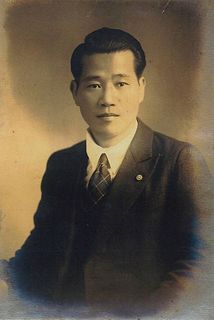 W
WCai Hesen was an early leader of the Chinese Communist Party (CCP), and a friend and comrade of Mao Zedong. Cai was born in Shanghai but grew up in Shuangfeng County in Hunan Province of China. He helped Mao organize the Changsha New People's Study Society. In 1919 he went to France on the Work-Study program, and his letters of advocacy were important in convincing Mao of the Bolshevik revolutionary approach. On his return to China, he was an important leader and organizer for the young Communist Party, spent several years in Moscow, and returned to China again in 1931. While organizing revolutionary activity in Hong Kong, he was arrested and given over to Canton authorities, who executed him in August, 1931.
 W
WDate Junnosuke , known as Zhang Zongyuan in Chinese after changing his name and nationality, was a Japanese bandit and ronin active in early 20th century China. He was a part of the Manchu-Mongol Independence Movement and the Shandong Autonomy Movement. He was a descendant of Date Masamune and a member of the Date clan.
 W
WDeng Zhongxia was an early member of the Communist Party of China and an important Marxist intellectual and labor movement leader. Having led many strikes and uprisings against Chiang Kai-shek's Kuomintang government, he became one of the most wanted CPC members by the Kuomintang. He was captured and executed in 1933.
 W
WDeng Yanda was a military officer in the Chinese Nationalist Party. He broke with party leaders in 1927, denouncing them as traitors to the party's original principles and in 1930 attempted to form a new party, which he called the Provisional Action Committee of the Chinese Nationalist Party or Third Party. It was later renamed the Chinese Peasants' and Workers' Democratic Party. In 1931 he was convicted of treason by the Nationalist government and secretly executed. Today, Deng is recognized as a revolutionary martyr by the People's Republic of China.
 W
WHan Fuju or Han Fu-chü was a Kuomintang general in the early 20th century. He rose up the ranks of the Guominjun clique in the Warlord era but then went over to the Kuomintang, and held the position of military governor of Shandong from 1930 to 1938. Han had one wife, two concubines, and four sons.
 W
WJi Hongchang, born Ji Hengli, was a Chinese general and patriot.
 W
WMei Siping was a Kuomintang politician of the Republic of China and associate of Wang Jingwei. He served in various posts in Wang's government in Nanjing, as well as president of Southern University in 1945, and briefly held office as governor of his home province.
 W
WShao Piaoping, originally named Jingqing (鏡清), later renamed himself Zhenqing (振青), was a journalist, an author and a political activist in China during the 19th century.
 W
WTan Ting-pho, was a well-known Taiwanese painter. In 1926, his oil painting Street of Chiayi was featured in the seventh Empire Art Exhibition in Japan, which was the first time a Taiwanese artist's work could be displayed at the exhibition. Tan devoted his life to education and creation, and was greatly concerned about the development of humanist culture in Taiwan. He was not only devoted to the improvement of his own painting, but also to the promotion of the aesthetic education of the Taiwanese people. He was killed as a result of the February 28 Incident, a 1947 uprising in Taiwan which was repressed by the Kuomintang (KMT).
 W
WHisakazu Tanaka was a lieutenant general in the Imperial Japanese Army, and governor of Japanese-occuped Hong Kong in World War II. His name is occasionally transliterated "Tanaka Hisaichi".
 W
WTang Te-chang, also known as Tokushō Sakai , was a Taiwanese lawyer of Japanese descent, born in Tainan during Japanese rule. He was killed in the February 28 Incident.
 W
WXia Chao was the long-time police chief of Zhejiang Province during the Chinese Warlord Era (1916–1928), and also served as the province's civil governor from 1924 to 1926. He was among the most powerful political figures in Zhejiang throughout much of his career. In order to maintain and expand his influence over the province, Xia opportunistically played out different Chinese warlord factions against each other. Plotting to gain Zhejiang's independence from the warlord regime of Sun Chuanfang, Xia launched a rebellion in 1926, but was captured and summarily executed.